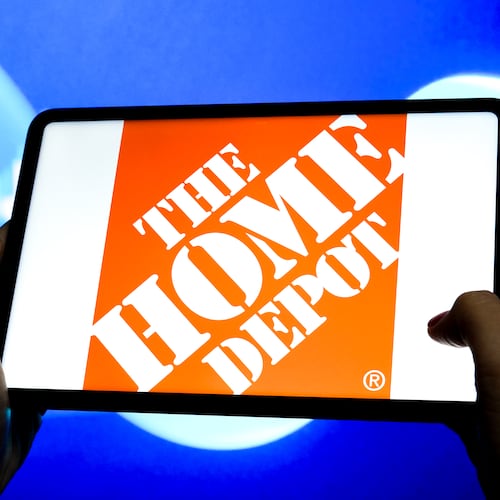A slow housing market and increased consumer uncertainty is weighing on home improvement giant Home Depot.
The Vinings-based retailer on Tuesday said it missed expectations in its fiscal third quarter. The company also lowered its full-year profit outlook.
Home Depot is an economic bellwether and its financial results are closely watched as a gauge of consumer spending and the housing market.
“Housing has been soft for some time,” Ted Decker, Home Depot chair, president and CEO, said on an earnings call Tuesday. “We all know higher interest rates and affordability concerns, but what we’re seeing now is even less turnover. The housing activity is truly at 40-year lows.”
He said later in the call the company estimates a $50 billion underspend in normal repair and remodel activity. Consumers feel concerned about living costs and job stability, he added.
Home Depot said its net income dipped to $3.6 billion during the third quarter, down 1.3% from the same period last year.
The company’s sales grew to $41.35 billion, up 2.8% from the third quarter of 2024. But that number included about $900 million of sales from GMS Inc., the Tucker-based specialty building products distributor it recently acquired for $5.5 billion.
Comparable sales for the third quarter increased 0.2%.
Credit: Courtesy photo
Credit: Courtesy photo
Home Depot said a big factor in third quarter was a lack of seasonal storms such as hurricanes — which put pressure in categories such as roofing, power generation and plywood.
In the fall last year, hurricanes Helene and Milton, for instance, made landfall as major tropical cyclones that wrought significant damage in the Southeast.
“We did expect to start seeing some pickup in demand in the second half of the year,” Decker said on the call. “But we really just saw ongoing consumer uncertainty and pressure in housing that are disproportionately impacting home improvement demand.”
The company lowered its full-year comparable sales growth outlook, which it now expects to be “slightly positive” when previously it forecast 1% growth. It also lowered its adjusted earnings-per-share guidance, which it now anticipates to decline 5% from the previous year.
The retailer now expects full-year sales to grow 3%, including $2 billion in incremental sales from GMS, which had not been previously included in its full-year guidance. It previously forecast full-year sales to grow 2.8%.
Joe Feldman, senior managing director and assistant director of research at investment firm Telsey Advisory Group, in a note Tuesday called the company’s results and guidance reduction “disappointing.”
“Nonetheless, we continue to believe Home Depot is taking share and executing well, and the company stands to benefit as housing demand recovers,” Feldman said.
Home Depot had said in August that customers were shying away from large home improvement projects because of high interest rates. At that time, it also noted “modest price movement” on certain goods caused by tariffs instituted by President Donald Trump.
The Federal Reserve has cut interest rates twice since then to address a weakening labor market. Consumers remain worried about persistent inflation, which has risen this year amid global trade wars.
“We continue to see softer engagement in larger discretionary projects, where customers typically use financing to fund renovation projects, during the third quarter,” Billy Bastek, Home Depot’s executive vice president of merchandising, said on the call Tuesday.
Home Depot has worked to offset that weaker demand by boosting its offerings to professional contractors. The company made two large acquisitions, GMS and SRS Distribution, and ramped up capabilities such as trade credit and sales support.
On Tuesday, Home Depot reported that comparable transactions over $1,000 were up 2.3% in third quarter, compared to the same period last year, a signal of more sales from pros, Decker said.
During a supplier conference last month in Atlanta, Decker suggested 2026 might not be an easier year for the company.
“We all know we have a frozen housing market, and we have increasing customer uncertainty,” he told the audience. “And that consumer uncertainty is moving up even into the top income levels.”
Decker mentioned some “signs of promise,” such as lower mortgage rates, which he said could improve housing affordability.
“Inflation and hopefully even tariffs will begin to settle down,” Decker said. “We’re going to keep pushing hard, regardless of any environment. … We’re focused on controlling what we can control.”
Home Depot’s stock dropped almost 4% as of mid-day Tuesday.
About the Author
Keep Reading
The Latest
Featured




